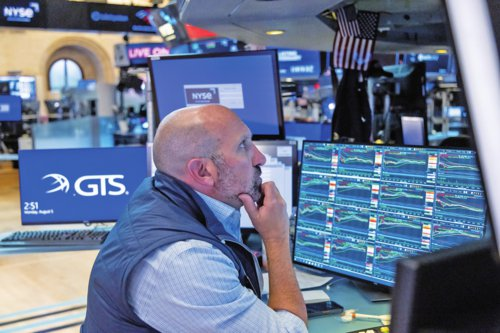
On December 19, 2024, global financial markets experienced an unprecedented violent fluctuation. After the Federal Reserve announced a 25-basis-point interest rate cut, the three major US stock indices - the Dow Jones Industrial Average (Dow), the Nasdaq Composite Index (Nasdaq), and the S&P 500 Index (S&P 500) - all plunged simultaneously, with the Dow dropping over 1,000 points, setting a record for ten consecutive trading days of decline since 1974. This sudden market turmoil not only caught investors off guard, but also sparked deep concerns about the stability of financial markets and the outlook of the US economy worldwide.
The Federal Reserve's interest rate cut decision was originally seen as a positive stimulus to economic growth, aiming to ease downward pressure on the economy and boost market confidence. However, this time, the interest rate cut did not bring about the expected positive market response. After the announcement of the interest rate cut, the US stock market quickly plunged into a panic selling, causing all three major indices to plunge. This result not only went against market expectations, but also revealed the divergence of investors' interpretations of the Fed's policy and their uncertainty about the future economic outlook.
The Federal Reserve cut interest rates while also sending out a series of complex policy signals. In his press conference, Fed Chairman Powell indicated that the restrictive stance of policy had clearly weakened, but that more caution should be exercised in considering further interest rate adjustments. He also noted that the Fed had not set any predetermined path for interest rates and expected only two rate cuts by 2025, far fewer than the previously projected four. This shift in policy stance disappointed the market, causing investors' expectations for future interest rate cuts to plummet, leading to pressure on the stock market.
In the atmosphere of panic selling, the decline in US stock markets continued to worsen. Even large tech stocks could not escape the fall, with tech giants such as Tesla, Amazon, and Microsoft all falling, further exacerbating the market decline. This widespread market decline not only caused significant losses for investors, but also had a negative impact on the global economic outlook.
Investors are taking a cautious approach to upcoming economic data and corporate earnings reports, coupled with the uncertainty of geopolitical factors, which has made market sentiment even more tense. In the backdrop of panic selling, investors are seeking safe-haven assets, leading to a sharp rise in the dollar index and sharp declines in the prices of gold, silver and other precious metals. This market reaction not only exacerbates market volatility but also raises concerns about the stability of financial markets among investors.
The plunge in the US stock market not only affected domestic investors but also triggered a chain reaction in global financial markets. Major European stock indices also fell across the board after opening, although some markets later rebounded, but the overall market sentiment remained subdued. Meanwhile, international oil and gold prices also fluctuated, reflecting the global financial market's sensitivity and interconnectedness to the plunge in the US stock market.
This market turmoil not only reveals the divergence of investors' interpretations of the Fed's policy and uncertainty about the future economic outlook, but also raises global concerns about the stability of financial markets and the economic outlook. Investors worry that if the US stock market continues to decline, it may trigger further turmoil in global financial markets and even trigger a financial crisis. This concern has made market sentiment more pessimistic, and investors are seeking safe-haven assets, leading to a sharp rise in the dollar index and a sharp decline in the prices of gold, silver and other precious metals.
Faced with this sudden market fluctuation, we need to reflect and draw lessons from multiple angles. Firstly, the Fed's interest rate cut decision, aimed at stimulating economic growth, also needs to be more cautiously considered in terms of market reaction and investor sentiment. Secondly, investors need to remain calm and rational, avoiding blind herding and panic selling. Finally, governments and financial institutions around the world need to strengthen communication and coordination to jointly cope with the turbulence and challenges in the global financial market.
Furthermore, this market turmoil also reminds us that the stability and risk management mechanisms of financial markets are of paramount importance. Governments and financial institutions in various countries need to strengthen their supervision and risk prevention of financial markets to ensure the stable operation of financial markets. Meanwhile, investors also need to enhance their risk management and asset allocation capabilities to cope with the uncertainty and volatility of the market.
The simultaneous plunge of the three major US stock indices, including the Dow Jones Industrial Average, plunging over 1,000 points, was not only a financial storm outbreak, but also a profound test of the global economic outlook and the stability of financial markets. Faced with the impact and challenges brought by this storm, we need to reflect and improve from multiple angles. Only by strengthening the construction of communication, coordination, supervision and risk management mechanisms can we ensure the stable operation of financial markets and sustained development of the global economy. At the same time, we also look forward to the global financial market ushering in more stable and sustainable development, injecting new vitality and impetus into the global economy.

Below is the English translation of the text, with precise handling of political terms, consistent sentence structures, and preservation of the original’s analytical tone and logical flow:
Below is the English translation of the text, with precise …
On December 15 local time, Trump took the British Broadcast…
In recent years, the application of artificial intelligence…
According to Yahoo US media reports, the recent remarks of …
After 11 years of waiting in the deep sea, we finally have …
On December 17, 2025, the newly renovated American "Preside…